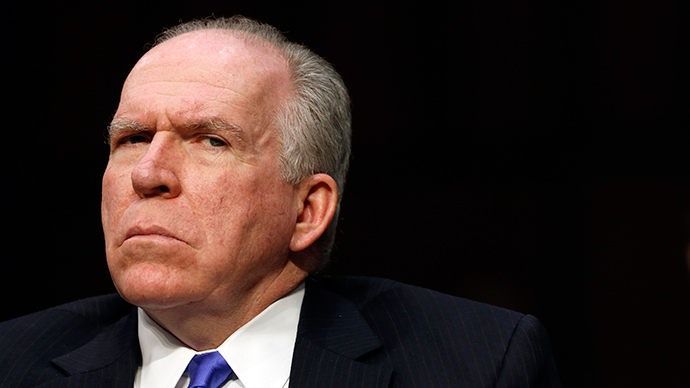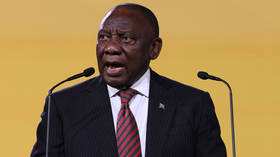CIA chief challenges torture report claims, defends Bush-era tactics

The head of the Central Intelligence Agency defended his office’s past use of “enhanced interrogation techniques” on Thursday, two days after a Senate panel published a grim account of the torture tactics used on detainees under the Bush administration.
In his first remarks since the Senate Intelligence Committee released its so-called “torture report” concerning the CIA’s former interrogation practices, agency director John Brennan challenged claims contained therein that intel officials ever intended to mislead Congress or the public. Some officers, however, fell short of being held accountable, he acknowledged.
Brennan claimed the CIA didn’t intentionally deceive the president and the public during his rare, 45-minute address, as the Senate report had stated, and also attempted to counter claims that the use of controversial tactics had no impact on eliciting intelligence from detainees. And although the agency head admitted the CIA has room for improvement, he said that “the nation and this agency in particular did a lot of things right” following the September 11, 2001 terrorist attacks when the United States intelligence community found itself ill prepared and in “uncharted territory.”
“We had little experience housing detainees, and precious few of our officers were trained interrogators," Brennan said of the CIA. “But the president authorized the effort six days after 9/11, and it was our job to carry it out.”
The United States president who authorized the CIA’s post-9/11 policies, George W. Bush, and his vice president, Dick Cheney, defended the intelligence community’s controversial tactics earlier this week concurrent with the release of the Senate panel’s long-awaited report. Some lawmakers on Capitol Hill have not agreed with the Bush administration’s take, however, with Sen. Mark Udall (D-Colorado) going as far as to urge Brennan to resign from the CIA during a lengthy speech on the Senate floor early Wednesday.
Director Brennan is correct. I fully support current counterterrorism efforts.
— Sen Dianne Feinstein (@SenFeinstein) December 11, 2014
But although Brennan did not head the CIA during the Bush administration – he was confirmed by the US Senate to take that role only 1.5 years ago by President Barack Obama – he stood by the agency on Thursday and defended the enhanced interrogation techniques, or EITs, described at length in this week’s report, saying that some of the detainees held by the CIA and subjected to such tactics did, in fact, disclose critical information. Whether that intel was a result of enduring days of sleep deprivation, waterboarding, or any of the other tactics detailed in the Senate report, however, is impossible to know, Brennan said.
RED MORE: ‘US govt uses CIA torture report to heighten security and reinforce idea of war on terror’
On the contrary, the Senate report concluded that the use of torture tactics was ineffective, unnecessary, and often led to detainees disclosing false information in hopes of having the EITs end. Brennan agreed that some agents went over the line in the immediate aftermath of 9/11, but insisted that EITs did without a doubt play some sort of role with respect to successfully getting critical information out of suspected terrorists.
The “cause and effect” between those torture tactics and the end result “is unknown and unknowable,” Brennan said. “But for someone to say that there was no intelligence of value, of use, that came from those detainees once they were subjected to EITs, I think that…lacks any foundation at all.”
No evidence that terror attacks were stopped, terrorists captured or lives saved through use of EITs. #ReadTheReport
— Sen Dianne Feinstein (@SenFeinstein) December 11, 2014
“In a limited number of cases, agency officers used interrogation techniques that had not been authorized,” Brennan admitted at one point during Thursday’s address, adding that he personally considers those tactics to be “abhorrent.”
“None of these lapses should be excused, downplayed or denied,” Brennan added. Even if Brennan did acknowledge he considered those lapses to be “abhorrent,” he refused to refer to EITs as “torture” when asked by an Associated Press reporter during Thursday’s event.
READ MORE: ‘CIA will continue torture with help of mediators’ – UK's former envoy to Uzbekistan
“First of all, I certainly agree that there were times when CIA officers exceeded the policy guidance that was given and the authorized techniques that were approved and determined to be lawful. They went outside of the bounds,” he said. “And they were harsh, as I said, in some instances, I consider them abhorrent.”
“I will leave to others how they might want to label those activities,” Brennan said, “but for me it was something that was certainly regrettable.”
Brennan: "unknowable" if we could have gotten the intel other ways. Study shows it IS knowable: CIA had info before torture. #ReadTheReport
— Sen Dianne Feinstein (@SenFeinstein) December 11, 2014
Elsewhere in Thursday’s address, Brennan challenged claims from the Senate committee concerning the CIA’s alleged untrustworthiness, saying the agency takes "exceptional pride in providing truth to power.”
“I look back at the record and I see that this was a workforce that was trying to do the right thing,” Brennan added. “I cannot say with certainty whether or not individuals acted with complete honesty when I look at what went on at the time,” adding, “there were clearly questions about why certain techniques were used.”
Indeed, the Senate Intelligence Committee did raise numerous questions in the lengthy, 500-plus-page executive summary of their report published this week about the CIA’s torture program. But while Brennan blasted the congressional panel during Thursday’s talk as having mischaracterized the CIA as untruthful, he will likely be asked to explain further in the near future about one of the Senate’s findings in particular that has contrasted sharply with the director’s determinations: answering to a McClatchy reporter curious as to whether Brennan stands by the statement that only three individuals were waterboarded by the CIA as previously admitted by the agency – yet challenged by the Senate. Brennan refused to budge and buy into the panel’s claims that many more detainees endured the simulated drowning tactic.
“Based on everything I see, that I read, it indicated that there were three individuals that were subjected to that. And I can only tell you what I’m aware of, what I have read, and the data I’ve observed.”
Although only holding a deputy rank at the time of 9/11, Brennan said Thursday that he was indeed aware of some of the torture tactics used against CIA detainees at the time.
READ MORE: Not-so-magnificent 7: Nations named & shamed in CIA torture report











